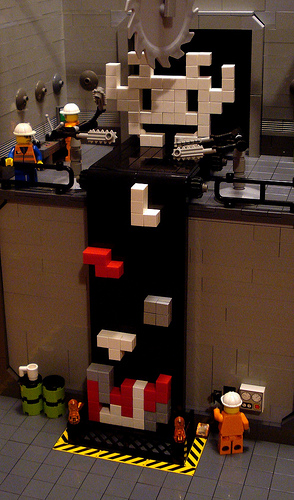A study in 2009 tested the effect of Tetris on memory consolidation. Forty participants were split into two groups. After watching a film showing traumatic stuff (surgery, people drowning etc), one group sat quietly while the other was told to play Tetris for 10 minutes. All participants kept a diary for a week where they recorded their flashbacks. The Tetris group reported fewer, and scored lower on the Impact of Events questionnaire.
Before we go on to the reasons and implications of this, might I suggest this listening music for the rest of the post?:
The idea is, that if you keep the visuo-spatial system busy, it has a harder time consolidating this memory. Other tests have suggested that the visuo-spatial element is key – verbal tasks, for instance seem to make flashbacks worse. This is thought to be because PTSD and flashbacks stem from two kinds of mental processing – visuo-spatial, and verbal/narrative. If the ratio is too heavy on the visuo-spatial side, you’re more likely to get flashbacks. This is also in line with other research on the beneficial effects of expressive writing as a form of therapy — perhaps this helps to bring the ratio back towards the verbal/narrative side.
So if you want to reduce unpleasant flashbacks, it’s best to carry a Gameboy around with you at all times, and if something traumatic happens, just whip it out and play for 10 minutes.
But since that’s pretty inconvenient for most people, there might be another way. Other research suggests that memories can be altered when you recall them, that is, the memory is loaded up and then “re-saved” when you’re done reminiscing/ruminating, and it’s possible to make “edits” to the “file” while it’s “loaded.” Maybe this plus tetris could equal something useful in therapy or self-help sessions. The idea is, you think back over the traumatic event and hold it mind. Then, start playing Tetris. I don’t know if this would work but if the authors of this paper are right that Eye Movement Desensitization and Reprocessing (EMDR) therapy (holding a memory in mind while moving your eyes around) works due to demand on the visuo-spatial system, then Tetris should too. Another advantage is you don’t have to feel like a twit sitting there moving your eyes while thinking bad thoughts.
Other suggestions would be basically to do the opposite of anthing related to accelerated learning during this session. So no exercise before hand, which helps sprout new neurons and aid learning, and no sleep afterwards, which also helps with memory creation. It’s like Accelerated Unlearning. How’s that for a book title? All I need to do is take this simple idea, explain it in five pages, then throw in 245 pages of anecdotes and other filler. Bestseller!
Interestingly, this only seems to affect involuntary flashbacks, because when a questionnaire about the film was administered after 1 week, the groups scored about even. Which is good since that would cause problems for students who use computer games as a break!

Comments
3 responses to “Playing Tetris reduces the effects of traumatic events”
Occupying the visuo-spatial system with video games seems pretty logical if you want to inhibit memories. In fact, that that might be even better than EDMR if you think about it. Tetris is more likely to hold attention, is more unpredictable, is goal-oriented and requires continuous cognitive input to manipulate the blocks. In EDMR once you’re given something to focus on, the whole process can become predictable and boring, attention might drop and the visuo-spactial systems gets a bit “freed up.”
Hi Demetrie, yeah good points, if keeping the visuo-spatial system is the key, Tetris is definitely the way to go. The paper also suggests that it has longer-term benefits, as it competes for visuo-spatial resources later on (when people think about Tetris). Can’t imagine the same with EMDR.
If you think about it. Tetris is more likely to hold attention, is more unpredictable, is goal-oriented and requires continuous cognitive